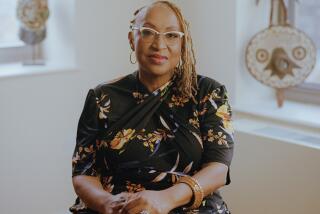Richard Restoring Cajun’s Blackened Name
- Share via
Accordionist Zachary Richard once was known as the “bad boy of Cajun music.” Now he’s trying to be its good example.
A long-time crusader for the preservation of the French culture and language from which Louisiana’s Cajun communities sprang, the 38-year-old Richard (pronounced Ree-SHARD) earned a reputation for stridence in his campaign, both on stage and off. It had a particular intensity in the mid-’70s when Richard returned to his Lafayette, La., home after living for several years in Quebec and Nova Scotia, where the French vs. English controversy has been especially divisive.
“I would go to bars and hang out and insult people I knew were Francophones, but who were too lazy to speak to me in French,” said Richard, who will bring his band to the Music Machine tonight and the Belly-Up in Solana Beach on Saturday. “You’ve got a culture that has been considered worthless. My father was beaten in school for speaking French. I was brought up in a very traditional family environment. I was obliged to speak French as a child and I thank my parents and grandparents for that every day. But there is also still a great sense of shame associated with speaking French.”
Today, though, Richard has mellowed somewhat.
“I am still militant,” he said during a recent phone interview from San Francisco. “But you learn and understand things as you go along and your militancy alters. I speak French at home and with my friends and read and write in French, but I’m not going to go to a shopping mall and try to intimidate people into speaking French. The thing I can do is make it attractive to kids, show you can be hip and cool and speak French anyway.”
That’s where the music comes in. Never a Cajun music traditionalist, Richard--who began his career playing folk-rock and progressive country before taking up the accordion in the mid-’70s--mixes churning originals with rocked-up versions of Cajun standards like “Jolie Blonde” with a fire comparable to that fellow Cajun accordionist Jo-El Sonnier. And both on stage and on albums like his latest, “Zack’s Bon Ton,” he sings at least as much in English as in French.
“I never considered Cajun music a museum piece,” he said. “Within the last couple of years we’ve been able to create the right songs that fit into both the Cajun and rock ‘n’ roll camps--rock ‘n’ roll so heavily influenced by Cajun that it really is Cajun, although the purists would probably fall out of their chairs.”
Richard is somewhat cautious, though, about all the attention Cajun culture has received recently through movies such as “The Big Easy” (Richard contributed a song to the score), music and cuisine--specifically about the way elements of the culture have been co-opted for commercial value.
“If you talk about Cajun spice potato chips, how much relevance can that have to peoples’ lives?” he said. “None in Louisiana.”
Richard himself has been affected by that. One writer, impressed with his energetic performances, dubbed him the “Mick Jagger of Cajun music.”
“I’m really the Tina Turner of Cajun music,” Richard joked. “Whoever came up with that, I’m not sure if he thought he was doing me a favor or just lacked imagination. I’m flattered, but it’s an unfortunate thing to be compared to. I’ve been called the Cajun this and the Cajun that and I just scratch my head. I don’t think it puts the Cajun culture in perspective, because we don’t need to be compared to anyone.”
But on the other hand, he believes that Cajun culture’s recognition throughout the country is a positive step.
“It has caught on as a fad, which will pass,” he said. “But it has made Cajun people proud of what they are. Until someone from the outside said that Cajun is hot, for the first time in their lives these people realized the importance of the culture for themselves.”
And he’s happy that Cajun music’s increased visibility has given him more of a platform to further his cause.
“It’s important to maintain oneself as a standard bearer, as an example, as one who still exists even if we are the vestiges of a culture that has become assimilated.”
More to Read
The biggest entertainment stories
Get our big stories about Hollywood, film, television, music, arts, culture and more right in your inbox as soon as they publish.
You may occasionally receive promotional content from the Los Angeles Times.










